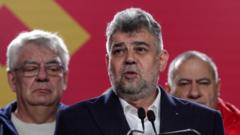Amidst political uncertainty and rising far-right sentiments, Friedrich Merz's coalition government seeks to restore stability and improve Germany's standing in Europe.
Merz Takes Chancellor Role as Germany Emerges from Political Standstill

Merz Takes Chancellor Role as Germany Emerges from Political Standstill
Germany swears in a new government under conservative Friedrich Merz, promising economic revitalization and international collaboration.
Germany is on the brink of a new political chapter as conservative leader Friedrich Merz prepares to be sworn in as Chancellor. His election marks the end of a lengthy stalemate, following the collapse of the previous administration. Merz, at 69 years old, vows to rejuvenate Germany’s declining economy and strengthen its international presence.
“There’s a historic obligation for us to ensure the success of this government,” Merz stated after signing a coalition agreement with the Social Democrats (SPD). As he transitions into leadership, he faces the challenge of navigating both domestic dissatisfaction and international pressures.
His coalition, consisting of the CDU/CSU and SPD, holds a slim majority with 328 seats—just twelve above the minimum required. The recent federal elections showed a slight increase for the CDU/CSU at the expense of the SPD, who suffered their worst electoral outcome in post-war history.
Merz has outlined dynamic plans, including changes to immigration policy, enhancing the ailing infrastructure, and rebuilding relationships with European neighbors. He has proactively enacted a law to bypass Germany's stringent debt regulations concerning defense spending, intentionally positioning himself for a forthcoming budget debate.
Analysts suggest that for Merz to maintain public confidence, he must advocate for Defense budgets effectively while keeping the needs of citizens in mind. “He must demonstrate responsible governance to quell rising voter discontent,” commented Mark Helfrich, a CDU Bundestag member.
The far-right Alternative für Deutschland (AfD) stands as a formidable opponent, now the principal opposition in the Bundestag. The AfD's extremist ideologies, including stringent immigration policies and a pro-Russian stance, have recently provoked a surge in chatter about their future in German politics, especially after their recent designation as an extremist group by the domestic intelligence agency BfV.
As tensions rise, managing US relations will be critical for Merz, an Atlanticist who oddly suggested European autonomy from American influence. His first foreign visits are projected to be to Paris and Warsaw, aiming to smooth over recent frictions attributed to the previous governance, which Polish representatives criticized for its perceived weakness.
With each move, Merz must tread carefully, balancing domestic expectations against international relations and encroaching opposition. The political landscape in Germany is shifting as leaders focus on demonstrating assertive governance in deceptively calm waters.



















